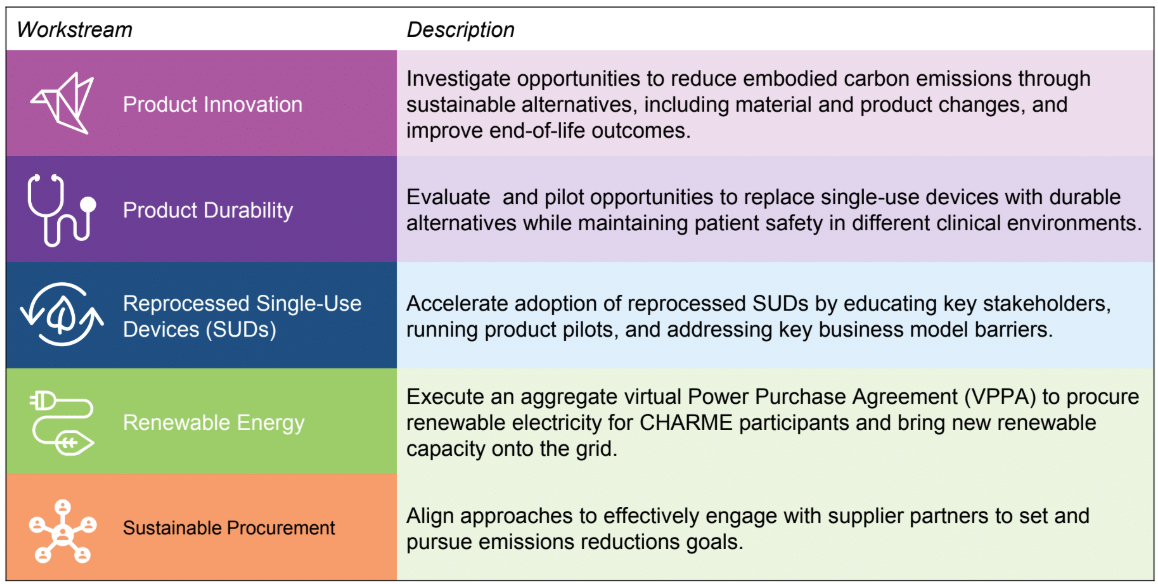Collaborative for Healthcare Action to Reduce MedTech Emissions (CHARME)


About CHARME
CHARME is an initiative convening health systems, medical device and equipment suppliers, distributors, GPOs, and other key industry stakeholders to define, implement, and champion best practices to reduce emissions from the MedTech supply chain. CHARME members work collaboratively to implement actions along a 24-month decarbonization roadmap defined in the white paper Catalyzing Collective Action to Decarbonize Healthcare Roadmap for Health Systems and MedTech Suppliers, published in May 2023 with input from over 30 organizations.
Sign Up for the CHARME Newsletter
CHARME addresses a gap in current industry initiatives related to reducing supply chain greenhouse gas emissions for medical devices and supplies, which makes up 7% of the health sector’s US footprint. Multi-stakeholder collaboration is needed to decarbonize at the pace and scale required, and working together provides efficiencies and innovation no single company can achieve alone.
How CHARME Works
CHARME is an action-oriented, 24-month initiative focused on enabling collaborative efforts within the health value chain to achieve rapid progress toward industry and individual members’ decarbonization goals. CHARME members actively participate in at least one of the initiative’s workstreams to amplify the individual progress each member is making towards emissions reduction goals.
CHARME officially launched on April 9th 2024 and continues to welcome new participants. Hear program conveners and industry leaders at the CHARME launch event describe the importance of this collaborative:
Watch the CHARME Launch Recording
CHARME’s Focus for Impact
CHARME participants have prioritized five workstreams to advance near-term efforts to decarbonize the MedTech value chain:

Embedded carbon in MedTech products contributes substantially to both health system and supplier Scope 3 emissions. However, changing products can be particularly challenging because design and manufacturing changes may require significant upfront investment, longer timelines, and regulatory considerations. Collaboration between health systems and MedTech suppliers creates a significant opportunity to focus on specific subsets or categories of products and identify best practices to decarbonize across the product lifecycle.
The workstream participants have defined three focus areas:
- Bio-plastics: Replace single-use, petroleum-based products with a bio-plastic alternative.
- Regional material recovery facility (MRF): Produce a roadmap for launching a regional MRF to aggregate healthcare plastics to improve recycling opportunities.
- Global product assessment: Develop criteria to evaluate and identify lower-carbon products available in global markets and support market expansion to the United States.
Product utilization plays an important role in the emissions generated over the course of a product’s lifecycle. The Product Durability workstream is evaluating opportunities to replace single-use devices with durable options while maintaining patient safety across clinical environments.
The workstream participants are advancing pilots and developing toolkits to support adoption of reusable isolation gowns to lay the groundwork to pilot additional products.
This workstream is exploring common barriers to single-use device reprocessing programs to develop a playbook that will support wider adoption.
The workstream participants have defined four focus areas:
- Product piloting: Pilot new reprocessed products at health systems to increase breadth of adoption.
- Improving contract language: Develop language for health systems to use that supports adoption of reprocessed product usage without impacting total cost.
- Education and awareness: Educate clinicians, sustainability, and procurement staff on availability, safety, and efficacy of reprocessed SUDs and best practices.
- Supporting end-of-life processes: Improve end-of-life outcomes after use of reprocessed devices.
Transitioning to renewable energy is critical to decarbonization. In this workstream, health systems and MedTech suppliers are aggregating their energy demand to buy renewable electricity through a Virtual Power Purchase Agreement (VPPA). VPPAs are financial agreements where a solar developer designs, permits, and installs a solar energy system, then sells the power generated to a customer at a fixed rate typically lower than the local utility’s retail rate. Aggregate Power Purchase Agreements allow organizations to procure renewable electricity at a lower price, enable smaller companies to participate, and bring new renewable capacity onto the grid.
CHARME Participant Requirements
CHARME is an action-oriented, 24-month initiative focused on enabling meaningful efforts with the health value chain. The shared work and outputs of CHARME will amplify participating organizations’ progress towards emissions reduction goals. To ensure that CHARME enables these outcomes, participants are asked to meet the following requirements:
- Have a public greenhouse gas emissions reduction goal in place.
- Appoint a sustainability representative, a procurement representative, a clinical or product representative to participate in CHARME activities as needed, and a C-suite sponsor.
- Participate in at least one CHARME workstream.
- Attend at least 75% of CHARME meetings.
The estimated organizational time commitment for a CHARME participant is 4-6 hours per month.
Current CHARME Participants
Co-Chairs
| Kaiser Permanente | Vizient |
Key Supporters
|
BD (Becton, Dickinson and Company) Cencora GE HealthCare Henry Schein |
Johnson & Johnson McKesson Stryker |
Health Systems and Suppliers *
|
Advocate Health Allina Health Ambu American Red Cross Baxter Boston Medical Center Boston Scientific Cardinal Health Innovative Health Legacy Health Mass General Brigham |
Mayo Clinic Medtronic Northwell Health Philips Providence Roche SSM Health Stanford Health Care |
NGO Partners
|
AHRMM Health Care Without Harm Healthcare Plastics Recycling Council (HPRC) |
Institute for Healthcare Improvement (IHI) National Academy of Medicine The Society for Healthcare Epidemiology of America (SHEA) |
Thanks to the organizations that provided seed funding and sponsorship for this project.
 |
 |
CHARME is advised by:
![]()
The SPLC is proud to serve as CHARME's host organization, bringing key sustainable procurement expertise with a proven track record of building coalitions and supporting organizations as they design and execute meaningful sustainable procurement strategies.
